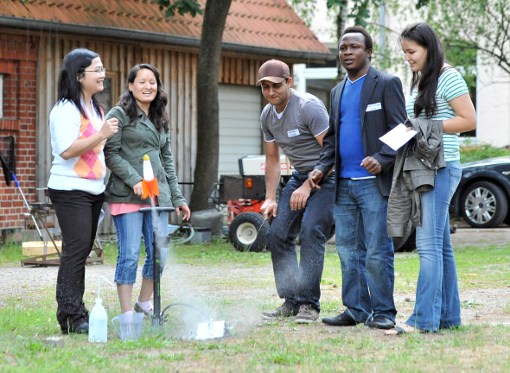The discussion between engineers and managers in Suderburg goes way beyond the usual matters of technology.
 Very few topics are as multifaceted as water. This became clear during the Millennium Express’s fifth stop in northern Germany for the workshop “Enough Water for all”. To turn this claim into reality, engineers must do more than build weirs, dams, irrigation works and canal systems. Social issues also play a significant role in the supply of water.
Very few topics are as multifaceted as water. This became clear during the Millennium Express’s fifth stop in northern Germany for the workshop “Enough Water for all”. To turn this claim into reality, engineers must do more than build weirs, dams, irrigation works and canal systems. Social issues also play a significant role in the supply of water.
The Suderburg workshop began with ‘water games’. Who can pump exactly one litre of water by just eyeballing it? Who can taste the difference between mineral water and water from the tap? The students from the “Climate Change and Water Management” (KLIWAWI) Masters programme had several stations set up for their workshop guests, inviting them to test their knowledge of the precious resource. The course took the DAAD scholarship holders, who had come to Suderburg from all over Germany, across campus and into the labs. What looked easy turned out to be quite tricky. “Everyone overshot the litre during the water-pumping task,” recounts Humberto da Silva from Brazil, a DAAD scholarship holder in the KLIWAWI programme.
For the hydraulic engineers, environmental engineers, agricultural engineers and natural scientists who met in northern Germany, technology makes up the lion’s share of their work. They were fascinated by the experiments being conducted in the laboratories at the Suderburg Campus of the Ostfalia University of Applied Sciences. One experiment that caught their attention was exploring the phenomena at weir spillways.
Better technology – better benefits
For the scholarship holders, water issues vary from country to country. But they also have plenty in common. The most common challenge is finding technologies that can transport water without wasting the precious resource. “In our climate, we either have too much water, evening flooding, or we have no rain at all, leading to drought,” explains Zaw Zaw Latt from Myanmar. He studies “Water Resources Management” and will begin his doctoral studies in Lüneburg on a DAAD scholarship starting this fall. Technical innovation is key, says Myint Thidar, who also comes from Myanmar. “We need to find out what technology will allow us to use the water in our environment effectively. What’s the best way to collect the water and store it, so it can be used to irrigate the fields in the dry season?” As Zaw Zaw Latt points out, those are big questions: “Sprinkler irrigation systems do not work in hot countries. The water evaporates before it even hits the ground.”
Commodity or human right?
The 40-some participants who took part in the four workshops asked very different questions. “We need to talk about fair water prices,” says Humberto da Silva, who is keeping tabs on the effects of climate change on the worldwide water supply. They say that in the next 45 years one out of every two people will live in an area prone to water shortage. “What’s happening with oil will happen to water. As it diminishes it will become more and more expensive,” says DAAD scholarship holder da Silva.
“One of the first things we learned here is that the price tag on water use is different the world over; in some places there’s no price tag at all,” explains Professor Klaus Röttcher, who coordinates the KLIWAWI programme. He helped his students prepare the workshop. The price of tap water is determined by costs factors such water purification, water mains and transport. “But how do we convey the actual value of water?” asks the Nepalese student Resha Piya, who is enrolled in the “Energy and Environmental Management” Masters programme in Flensburg with support from DAAD.
Although equal access to water became an official human right in 2002, more than 800 million people still do not enjoy this right. And it’s always the world’s poor that goes without. Is it right to demand payment from the poorest of the poor for a basic human right? The debate in Suderburg was heated, touching upon the most fundamental of issues. It really made a difference whether one was talking about water as a limited resource, as clean water and the right to access it, as drinking water or as ‘process water’, i.e. water used by people, businesses and industries for daily needs and operations.
“We achieved what we set out to do with the discussion,” says Klaus Röttcher. “Our plan was to trigger sharing and exchange, greater understanding and togetherness by letting the participants work together for a solid 2.5 hours, rather than just spending that time listening to others.” The intensity of the debate came as no surprise to Humberto da Silva, because as he says, “You can talk forever about water”.






